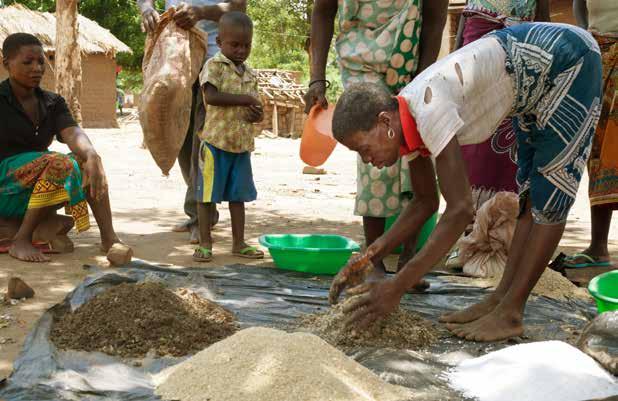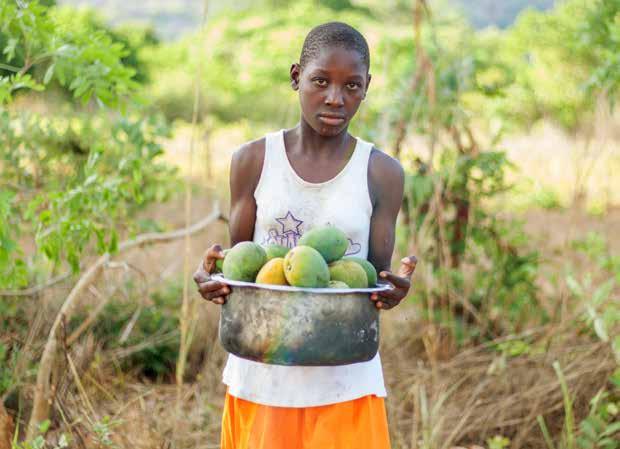
4 minute read
Mission in Malawi
The Anglican Church in Malawi and USPG are reaching out to sustain life and conserve livelihoods through simple irrigation technology, knowledge, and a Voluntary Savings and Loan (VSL) scheme.
alawi is one of the countries in the world, most challenged by the effects of climate change (World Bank, 2010). Much of the vulnerability to climate change is related to the fact that 90% of families depend on rain-watered agriculture to support their livelihoods.
Climate variability and change are already affecting Malawi, which has experienced significant dry spells and intense rainfall. These changes have led to an increase in the frequency of floods, cyclones, droughts, erratic and unreliable rainfall directly impacting vulnerable family’s incomes, food security, health and ability to support children’s education, especially girls.
The Anglican Council in Malawi and USPG help communities and churches by responding to this change and climate vulnerability through an Integrated Programme in Mission which helps families conserve livelihoods and live a full life.
As the Regional Manager for Africa, I have been lucky to see this firsthand on my trip during a Learning Review of a four-year Programme in Mission.
During my trip, I met inspiring families, men and women using simple irrigation technology to mitigate effects of drought on crop production at the family level supported by the Anglican Council in Malawi.
Valeria, Chairperson of the Tiyanjane farmers and Voluntary Savings and Loan (VSL) Group said, ‘Before joining the group, members were facing various problems like hunger, children were going to school hungry, lacked money to buy household basics like M
soap, salt, sugar, clothes for children, just to mention but a few. It was hard for us to have money throughout the year after selling our farm produce. We had to do casual labour to earn money for food.
‘However, after participating in the Voluntary Savings and Loan scheme for two years we decided as a group to venture into simple irrigation techniques, to expand ways of generating income for our household, we agreed to find some land for irrigation farming, since we had undergone various business, farming conservation and organic manure making training, we decided to ask the Anglican church to give us two treadle pumps’.
The Anglican church-supported Irrigation farming management training via the Ministry of Water and Irrigation. With the provision of two treadle pumps to start simple irrigation farming, the Tiyanjane group secured land
Above: Tiyanjane farmer group in Chapananga parish. Credit: USPG/Fran Mate
for irrigation farming, and upon receiving two treadle pumps from the Anglican church, the group used funds through VSL and purchased two more treadle pumps and seeds, increasing the number of treadle pumps to four.
Valeria said that ‘After our involvement in various activities with the Anglican church, the lives of 96 % members have changed significantly. We have learnt how to work in groups, we know how to do business, we have learnt modern farming methods, we can make local manure, and we are applying these skills in our farms. We now have enough food in our households, our children are putting on clean clothes, they are going to school on a full stomach, and we live in a very clean environment. We have acquired skills in different areas to support our lives, and we are able to buy household necessities. And above all, we now pray together and support each other even though we are from different denominations’.
The Tiyanjne group dreams of acquiring enough land for irrigation and solar-driven machines for irrigation so that many members of the community can benefit and have more than enough household.
The Tiyanjane farmers and VSL group have 36 members, established in August 2016 supported by the Anglican church to enable families to conserve livelihoods, be economically empowered and support girls’ education.
Another member, Nancy, told me that she could eat three times a day because she has enough food for her family. Nancy’s income also improved as a result of the programme. She farms and sells produce for income. She was then able to build an iron-roofed house which has given her comfort and pride. A single mother, she is now empowered economically such that she no longer depends on anyone for her household needs. Three hundred families are also championing fuel-efficient stoves and briquettes to conserve livelihoods and the environment. The programme trained families on how to make environmentally friendly stoves and briquettes in Samama and Chapananga. The briquettes are made from wastepaper and families are educated on the importance of using fuel-efficient stoves as a method of managing the environment. Over 826 families participated in environmental conservation campaigns and training.
Girls in targeted primary schools are trained in skills to conserve the environment. They learn how to make decorative bowls that reduce unnecessary waste and generate income to support family needs.
The Chair of the House of Bishops in Malawi, the Rt. Rev. Dr. Fanuel Magangani and Bishops said they are very grateful to USPG for journeying together with them in mission, which included leadership and human resource strengthening. ‘It is about the mission of God, which is not only spiritual but full wellbeing. We renew our commitment in this mission as long as we exist as a church’, the House of Bishops Anglican Council in Malawi has stated.

Pictured: Mercy from Chipayika village. In this picture she was captured harvesting mangoes from the fruit tree at her home which she shared with the review team. Credit: USPG/Fran Mate








